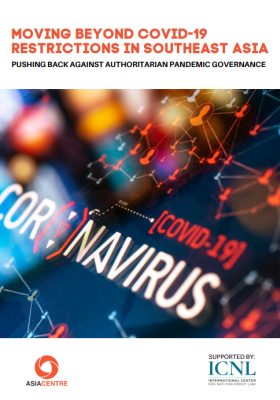
The policy paper “Moving Beyond COVID-19 Restrictions in Southeast Asia: Pushing Back Against Authoritarian Pandemic Governance” explores how the use of powers by Southeast Asian governments during the COVID-19 pandemic derogated rights. Emergency and temporary laws, as well as special provisions in infectious disease laws, impacted fundamental rights beyond what was necessary to keep the virus at bay. Consequently, control over the population was tightened and democracy backtracked. The paper demonstrates that governments used COVID-laws to amass disproportionate power and over-restrict civic freedoms on four ends. First, strict lockdowns were used to stifle freedom of assembly and protest. Second, anti-COVID measures were used by ruling political elites to limit campaigning activities and ensure that the status quo remained unchanged, partially disenfranchising voters from electoral processes. Third, fake-news laws were implemented to contain the spread of false information regarding the pandemic. Still, such laws were also used to silence political dissent. Fourth, online and physical surveillance increased to track the spread of the virus and, more generally, to track people’s actions beyond the essential to ensure public health. Given these developments, this paper includes a set of recommendations directed at governments, international organisations, and civil society organisations to improve governance in the post-pandemic era so that anti-COVID measures do not derogate people’s fundamental rights. Implementing these recommendations can help prevent and push back against the implications of authoritarian pandemic governance in Southeast Asia.



